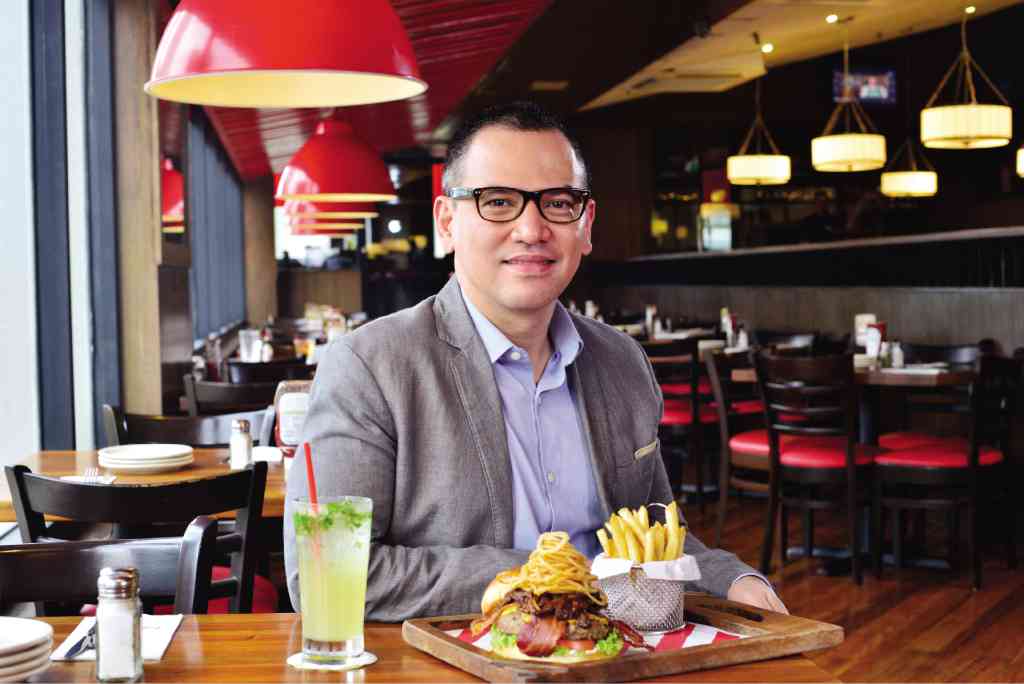PEOPLE, quality and service.
After 20 years in the Philippines, TGIFriday’s Restaurant still puts a premium on these three elements.
And The Bistro Group—the business that launched the first American casual dining chain here in the Philippines—believes that these three ingredients will carry it through many more years in the competitive industry.
Jean Paul Manuud, president and chief operating officer of The Bistro Group, admits that the journey to the 20-year mark was not all smooth sailing.
“We were pioneers in the serving of huge portions of food, refillable iced teas, Jack Daniel’s, huge hats and the singing of the birthday songs to the celebrant. All these concepts were ‘alien’ to the Philippine food industry,” he says.
Manuud adds that the competition was tough even back then. The most important challenge was to be consistent in terms of food and service quality
“We prepare our food fresh, from scratch every day. There is no compromise on quality. We used premium ingredients,” he adds, noting that customers can really tell if short cuts were made.
“This is why we don’t make it difficult for our customer. Before they leave, we fix the problem. It’s our way of turning garbage into gold,” he says.
It has been a long-standing rule in TGIFriday’s to make the experience of the customer its top priority.
“We don’t spend much on mainstream or on TV. Rather we focus on providing the best customer service. If the customer is not happy, we will work hard to bring you back,” he says.
To make that happen, The Bistro Group makes it a point to give the waitstaff top-tier training. The Bistro Academy was set up to instill in the staff the values which TGIFriday’s is known for, and that is all about “providing the best service to the customer.”
The Bistro Academy along Kamagong Street in Makati City recently acquired a license from the Technical Education and Skills Development Authority (Tesda) to teach short courses such as culinary and bartending.
Aside from teaching the staff the necessary set of skills, Manuud and his group also turn to self-motivation to pump them up.
“We teach them things like ‘when you’re good, opportunity will look for you. Anywhere you go, they will search for you. However, when you’re bad you’ll turn into a jumper. You won’t find stability,’” he says.
It was in 1997, during the East Asian financial crisis, when TGIFriday’s hit its lowest point.
Manuud narrates that due to the company’s dollar exposure, the group was dealt a huge blow.
Conditions deteriorated to the point that creditors nearly took over [restaurant] operations.
But Manuud and the rest of the board members put their collective best foot forward.
“Those were tough days. We were balancing a delicate act of paying our people, paying our suppliers and paying our landlord. The option of retrenchment also came up. And we had to close a restaurant. That’s how bad it was then,” he says.
What hurt them most was the fact that the crisis happened when it was also expanding aggressively. The landscape changed practically overnight and plans were suddenly put on hold.
“We already built the infrastructure and commissary. We had to close it down due to the crisis. We also acquired the franchise of TGIFriday’s in the Asia-Pacific,” he says.
The group learned soon enough that “it’s ok not to make money, but it’s not ok to lose money.”
Manuud says the group moved to renegotiate contracts with the banks and suppliers. And it worked.
Slowly but surely, The Bistro Group and TGIFriday’s became debt-free.
At the same time, management rallied the people, assuring them that they will be taken care of.
After weathering the perfect storm, the group started rebuilding with focus and passion.
It put in place cost-effective measures like eliminating spoilage and removing inefficient habits.
“We look at the business as our own. So when it came to picking out the locations, we often ask ourselves that if it were our money, would we open at a certain spot?” he says.
On its 20th year, TGIFriday’s is focused on moving forward and at the same time, looking back.
Included in its agenda was the redesign of the look and feel of the branches—no more vintage lamps, memorabilia and statues of action heroes.
Replacing these old features is the Heritage Wall with framed photos recapping TGIFriday’s history and depicting the journey of its founder, Alan Stilman.
“By tracing the past, one would understand the values that the restaurant displays with pride to this day: Commitment to serving good food and providing great service,” Manuud says.


